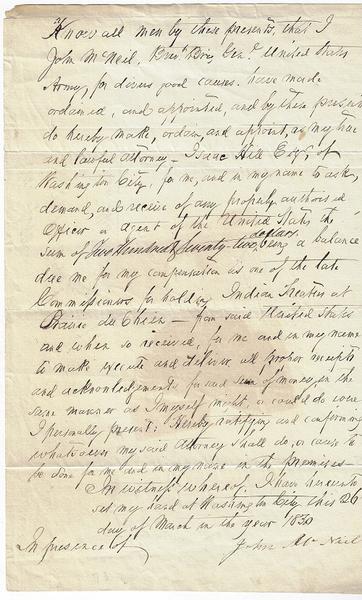General John McNeil - Treaty of Prairie du Chien - 1830

General John McNeil (1784 – 1850) signed manuscript document appointing Isaac Hill “As my lawful Attorney” to collect compensation now owed McNiel by the United States government for his service in Treating with the Sac and Fox Indians.
The Treaty of Prairie du Chien may refer to any of several treaties made and signed in Prairie du Chien, Wisconsin between the United States and representatives from the Sioux, Sac and Fox, Menominee, Ioway, Winnebago and the Anishinaabeg (Chippewa, Ottawa and Potawatomi Native American peoples.
Two treaties were negotiated simultaneously at Prairie du Chien in the summer of 1829, both signed by General John McNeil, Colonel Pierre Menard, and Caleb Atwater for the United States. Both treaties were proclaimed on January 2, 1830.
The second of these, the third Treaty of Prairie du Chien, concluded on August 1, 1829, was made between the United States and representatives of the Winnebago tribe. They also ceded land in northwestern Illinois and southwestern Wisconsin.
General John McNeil was a distinguished officer in the War of 1812 where he entered as a captain of infantry. “In 1814 he belonged to the first brigade, commanded by Gen. Scott, which opened a most glorious career of arms, in crossing the Niagara Straits and encountering the British veterans of the peninsular war.”
“At the battle of Chippewa McNeil commanded the advance of Scott’s brigade, the 11th regiment, Col. Campbell having been wounded in the early part of the action. In crossing the creek the leading regiment of the column encountered a most murderous fire, by which, in a few moments forty men were cut down. He advanced steadily on, with Jessup’s regiment next, and at the distance of thirty paces from the enemy they deployed into line; McNeil, of herculean frame and stentorian voice, called a lot, “Give it to them – take vengeance on them, boys.” And again, at the battle of Bridgewater, he had the honor to lead the celebrated Scott’s brigade into action, in the face of a British battery of nine guns. In less than an hour the whole brigade was literally cut to pieces. As Ripley and Portel’s brigades came into action McNeil redoubled his energies; when the 22nd Infantry broke, (its Colonel, Brady, having fallen,) McNeil rallied and reformed it. At this period of the action his horse was killed by a cannon ball and himself wounded in both legs by canister shot, a six-ounce ball passing directly through his right knee. At the close of the war he was retained in the army, and served on the Lakes and the Mississippi til 1829, when he was appointed a commissioner to negotiate with the Sac and Fox Indians.” (National Intelligencer, February 25, 1850)
One page, fully accomplished in a clerical hand, signed by McNeil, dated Washington D.C. 26 March, 1830. Expected minor wear, overall in vg cond. Includes a cut down print of McNiel.
